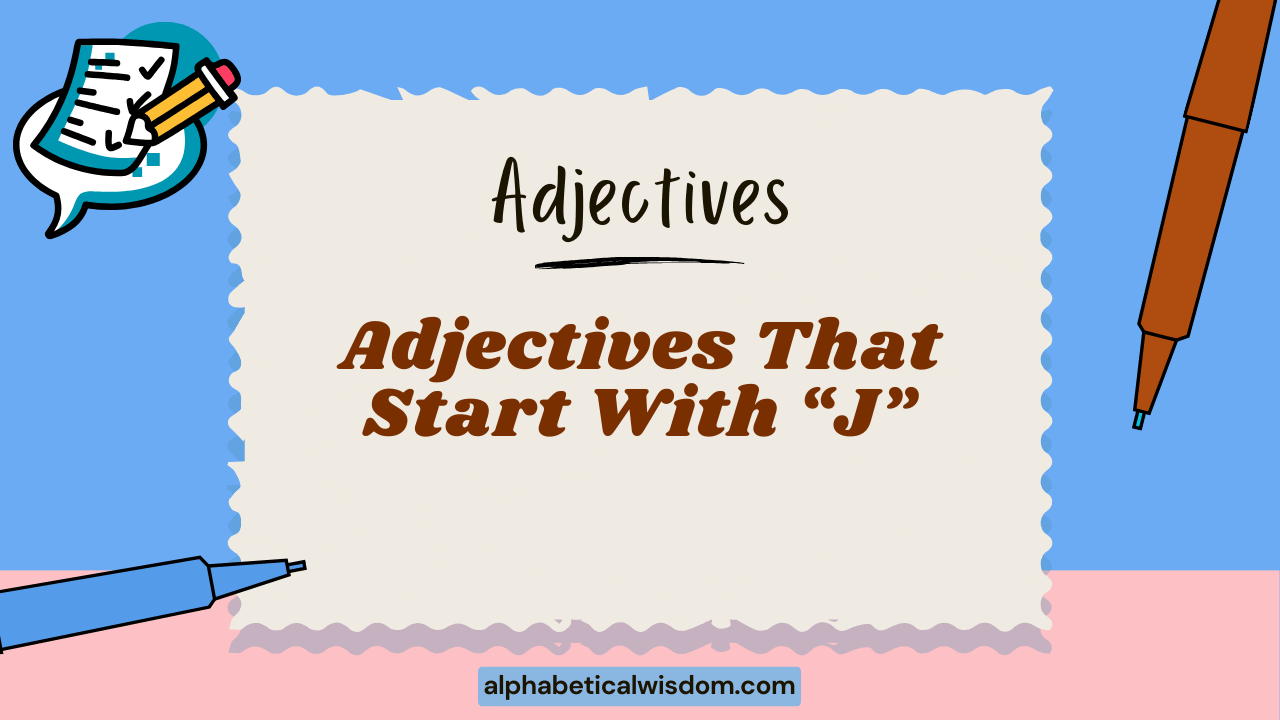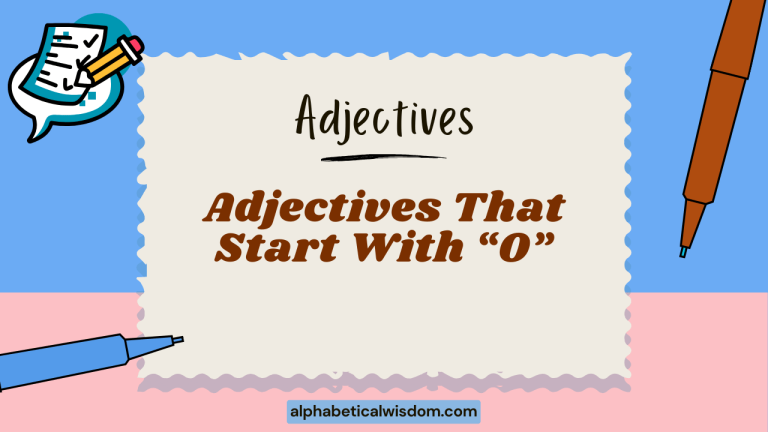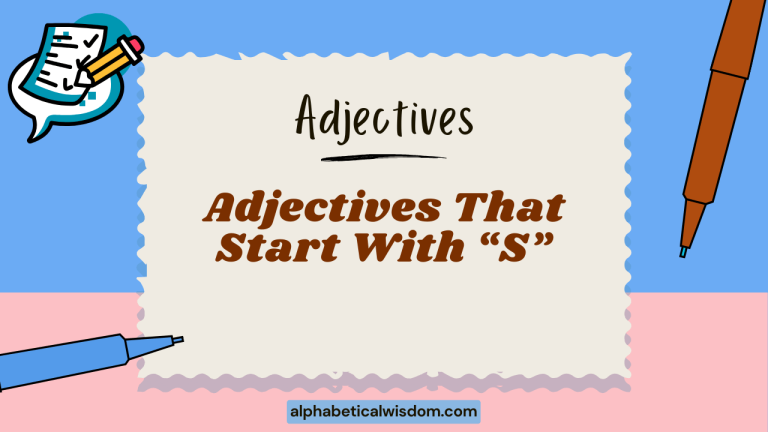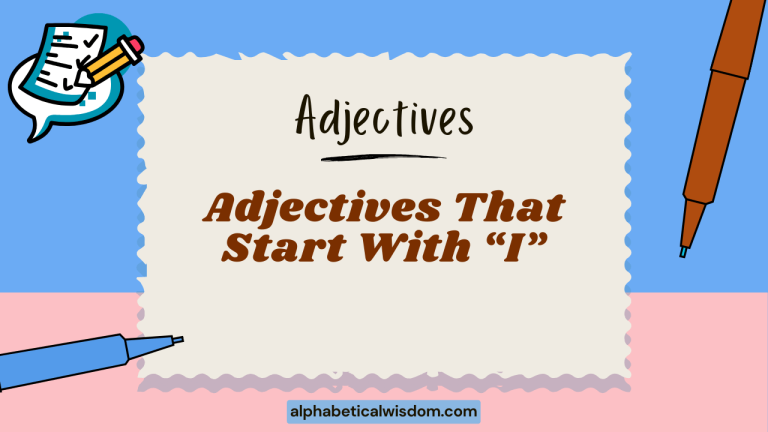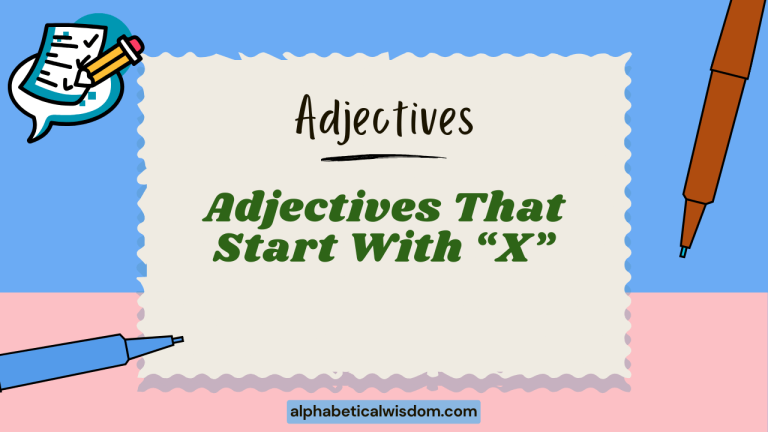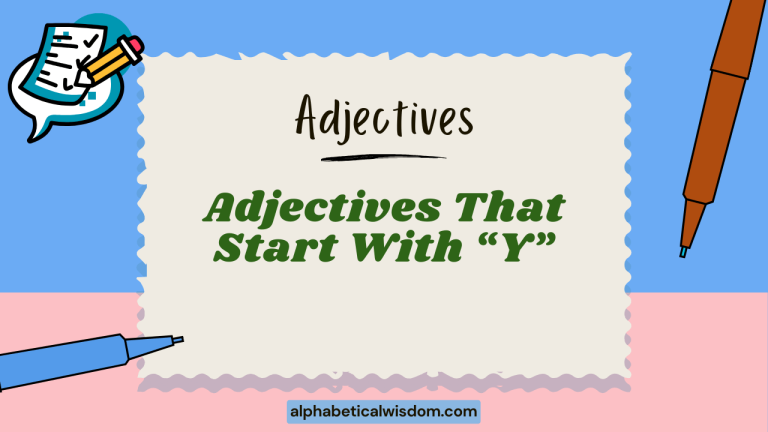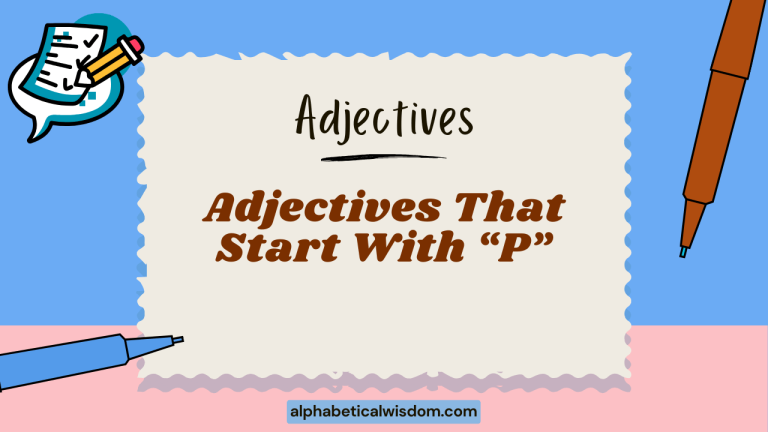Adjectives That Start With J: A Comprehensive Guide
Adjectives are the descriptive powerhouses of the English language, adding color, detail, and specificity to our sentences. Mastering adjectives, especially those starting with the letter “J,” can significantly enhance your vocabulary and writing skills.
This article provides a comprehensive exploration of adjectives that begin with “J,” focusing on their definitions, usage, and common applications. Whether you’re a student, writer, or language enthusiast, this guide will equip you with the knowledge and practice needed to confidently use “J” adjectives in your everyday communication.
Table of Contents
- Introduction
- Definition of Adjectives
- Structural Breakdown
- Types and Categories of “J” Adjectives
- Examples of “J” Adjectives
- Usage Rules for “J” Adjectives
- Common Mistakes with “J” Adjectives
- Practice Exercises
- Advanced Topics
- FAQ
- Conclusion
Introduction
Adjectives are essential for creating vivid and engaging descriptions in any language. They allow us to paint pictures with words, providing details that make our writing and speech more interesting and informative.
Specifically, adjectives starting with the letter “J” offer a unique set of descriptors that can add flair and precision to your communication. This article is designed to be a comprehensive guide to these “J” adjectives, covering everything from their basic definitions to their nuanced usage in various contexts.
By understanding and utilizing these adjectives effectively, you can elevate your English proficiency and express yourself with greater clarity and creativity. This guide is perfect for English language learners, writers seeking to expand their vocabulary, and anyone interested in improving their communication skills.
Definition of Adjectives
An adjective is a word that modifies or describes a noun or pronoun. Its primary function is to provide additional information about the noun or pronoun, such as its quality, size, shape, color, or other characteristics.
Adjectives play a crucial role in making language more descriptive and specific. They help us to differentiate between various nouns and create a clearer picture in the reader’s or listener’s mind.
Without adjectives, our language would be bland and lack the necessary detail to convey precise meanings.
Classification of Adjectives
Adjectives can be classified into several categories based on their function and meaning:
- Descriptive Adjectives: These adjectives describe the qualities or characteristics of a noun (e.g., beautiful, tall, intelligent).
- Quantitative Adjectives: These adjectives indicate the quantity or amount of a noun (e.g., many, few, some).
- Demonstrative Adjectives: These adjectives point out specific nouns (e.g., this, that, these, those).
- Possessive Adjectives: These adjectives show ownership (e.g., my, your, his, her, its, our, their).
- Interrogative Adjectives: These adjectives are used to ask questions about nouns (e.g., which, what, whose).
- Proper Adjectives: These adjectives are formed from proper nouns (e.g., American, Shakespearean, Victorian).
Function of Adjectives
The main function of an adjective is to modify a noun or pronoun. This modification can occur in two primary ways:
- Attributive Adjectives: These adjectives appear directly before the noun they modify (e.g., a red car).
- Predicative Adjectives: These adjectives appear after a linking verb and describe the subject of the sentence (e.g., The car is red).
Contexts of Adjective Use
Adjectives are used in various contexts to add detail and clarity to communication. They are essential in:
- Descriptive Writing: To create vivid imagery and engage the reader’s senses.
- Narrative Writing: To develop characters and settings.
- Technical Writing: To provide precise specifications and details.
- Everyday Conversation: To express opinions, preferences, and observations.
Structural Breakdown
Understanding the structure of how adjectives interact with other parts of speech is crucial for using them correctly. Adjectives typically precede the nouns they modify, but their placement can vary depending on the sentence structure and the type of adjective.
They can also be part of adjective phrases, which include the adjective and any modifiers that further describe it.
Adjective Placement
The typical placement of an adjective is before the noun it modifies. This is known as the attributive position.
For example:
- The joyful children played in the park.
- She wore a jade necklace.
However, adjectives can also appear after linking verbs such as be, seem, become, look, feel, etc. This is known as the predicative position. For example:
- The children were joyful.
- The necklace looks jade.
Adjective Phrases
An adjective phrase consists of an adjective and any words that modify it, such as adverbs or prepositional phrases. These phrases provide more detailed descriptions.
For example:
- A very joyful group of children. (very modifies joyful)
- A necklace of jade. (of jade modifies necklace, acting as an adjective phrase)
Order of Adjectives
When using multiple adjectives before a noun, there is a general order that sounds most natural to native English speakers. This order is typically:
- Quantity or number
- Quality or opinion
- Size
- Age
- Shape
- Color
- Origin
- Material
- Purpose
For example:
- The two beautiful large old round green Italian leather chairs.
Types and Categories of “J” Adjectives
Adjectives starting with “J” can be categorized based on their specific meanings and the types of qualities they describe. This section will explore some common categories and provide examples of adjectives within each category.
Descriptive “J” Adjectives
These adjectives describe qualities or characteristics of a noun. Examples include:
- Joyful: Full of joy; very happy.
- Jolly: Cheerful and friendly.
- Judicious: Showing good judgment; wise.
- Just: Fair and impartial.
- Juvenile: Young or immature.
Adjectives Describing Appearance
These adjectives describe how something or someone looks. Examples include:
- Jaunty: Having a lively and cheerful manner.
- Jade: Having the color of jade, a green gemstone.
Adjectives Describing Personality
These adjectives describe aspects of someone’s character or behavior. Examples include:
- Jealous: Envious of someone else’s possessions or qualities.
- Jocular: Fond of or characterized by joking; humorous or playful.
Adjectives Describing States or Conditions
These adjectives describe the state or condition of something. Examples include:
- Jarring: Causing a shock or disturbance.
Examples of “J” Adjectives
This section provides extensive examples of “J” adjectives used in sentences, organized by category. Each table will include a variety of adjectives and sentences to illustrate their usage.
Table 1: Descriptive “J” Adjectives in Sentences
The following table provides examples of descriptive “J” adjectives used in sentences. These adjectives help to add detail and specificity to the nouns they modify.
| Adjective | Sentence |
|---|---|
| Joyful | The children were joyful after receiving their gifts. |
| Jolly | Santa Claus is known for being a jolly character. |
| Judicious | The judge made a judicious decision based on the evidence. |
| Just | It is important to be just in all our dealings with others. |
| Juvenile | His behavior was juvenile and inappropriate for his age. |
| Jagged | The mountain range had jagged peaks that were difficult to climb. |
| Jam-packed | The concert hall was jam-packed with excited fans. |
| Japanese | She admired the intricate design of the Japanese garden. |
| Jasper | The necklace featured a beautiful jasper pendant. |
| Jaw-dropping | The special effects in the movie were jaw-dropping. |
| Jealous | She felt jealous of her friend’s success. |
| Jeering | The jeering crowd booed the losing team. |
| Jerky | The old car had a jerky ride. |
| Jestful | His jestful comments always brought laughter to the room. |
| Jeweled | The queen’s crown was jeweled and magnificent. |
| Jiggling | The jiggling pudding was a delight to watch. |
| Jinxed | The team felt jinxed after a series of unfortunate events. |
| Jobless | The jobless rate increased during the economic downturn. |
| Jocose | His jocose manner made everyone feel at ease. |
| Jogging | She wore her jogging shoes for the morning run. |
| Joining | The joining forces of the two companies created a powerful alliance. |
| Joint | The joint venture proved to be very successful. |
| Jolting | The jolting earthquake shook the entire city. |
| Jotting | He was jotting down notes during the lecture. |
| Journeying | The journeying travelers faced many challenges. |
| Jovial | The jovial host greeted his guests warmly. |
| Jubilant | The jubilant fans celebrated their team’s victory. |
| Judging | The judging panel had a difficult time choosing the winner. |
| Juicy | The juicy watermelon was perfect for a hot summer day. |
Table 2: “J” Adjectives Describing Appearance
This table provides examples of “J” adjectives that describe appearance, helping to create vivid images of people and objects.
| Adjective | Sentence |
|---|---|
| Jaunty | He wore a jaunty hat that made him stand out in the crowd. |
| Jade | She wore a jade green dress to the party. |
| Jowly | The bulldog had a jowly face. |
| Jet | The raven had jet black feathers. |
| Juniper | The hills were covered in juniper bushes. |
| Jarring | The combination of colors was jarring to the eye. |
| Ginger | The cat had ginger fur. |
| Glistening | The lake was glistening in the sunlight. |
| Gleaming | The car was gleaming after being washed. |
| Glossy | The magazine had a glossy cover. |
| Golden | The sunset was golden. |
| Gorgeous | She looked gorgeous in her wedding dress. |
| Graceful | The dancer moved with graceful elegance. |
| Grand | The castle was a grand sight. |
| Grandiose | The plan was grandiose in scale. |
| Graphic | The design was graphic and bold. |
| Grave | He had a grave expression on his face. |
| Gray | The sky was gray and overcast. |
| Greasy | The food was greasy. |
| Great | The experience was great. |
| Green | The grass was green and lush. |
| Gregarious | The dog was very gregarious. |
| Grim | The situation was grim. |
| Grinding | The machine was making a grinding noise. |
| Gripping | The movie was gripping. |
| Grisly | The scene was grisly. |
| Groomed | The dog was well groomed. |
| Gross | The food was gross. |
| Grotesque | The statue was grotesque. |
Table 3: “J” Adjectives Describing Personality
The following table provides examples of “J” adjectives that describe personality traits and behaviors.
| Adjective | Sentence |
|---|---|
| Jealous | She felt jealous when her friend got a promotion. |
| Jocular | His jocular nature made him popular among his colleagues. |
| Jumpy | The loud noise made the cat jumpy. |
| Gallant | The knight was gallant and brave. |
| Game | The team was game for the challenge. |
| Gammy | The old man had a gammy leg. |
| Gaseous | The planet was gaseous. |
| Gaudy | The decorations were gaudy and over the top. |
| Gay | The atmosphere was gay and festive. |
| Gee | The animal was very gee. |
| Gelling | The project was finally gelling together. |
| Generable | The data was generable from the system. |
| General | The manager gave a general overview of the project. |
| Generative | The software was generative. |
| Generic | The product was generic. |
| Generous | The philanthropist was very generous. |
| Genial | The host was genial and welcoming. |
| Gentle | The nurse was gentle with the patients. |
| Genuine | The antique was genuine. |
| Geographic | The study was geographic. |
| Geologic | The formation was geologic. |
| Geometric | The design was geometric. |
| Geriatric | The care was geriatric. |
| Germane | The information was germane to the issue. |
| Gestural | The communication was gestural. |
| Ghastly | The sight was ghastly. |
| Ghostly | The figure was ghostly. |
| Giant | The tree was giant. |
| Giddy | The child was giddy with excitement. |
Table 4: “J” Adjectives Describing States or Conditions
This table provides examples of “J” adjectives that describe different states or conditions.
| Adjective | Sentence |
|---|---|
| Jarring | The sudden noise was jarring and made her jump. |
| Jinxed | The team felt jinxed after a series of losses. |
| Jittery | He felt jittery before the big presentation. |
| Gone | The opportunity was gone. |
| Good | The news was good. |
| Gordian | The problem was gordian. |
| Gorgeous | The weather was gorgeous. |
| Gravely | The patient was gravely ill. |
| Gray | The market was gray. |
| Great | The success was great. |
| Green | The light was green. |
| Grievous | The mistake was grievous. |
| Groggy | She felt groggy after waking up. |
| Groomed | The animal was groomed. |
| Gross | The profit was gross. |
| Grounded | The plane was grounded. |
| Growing | The business was growing. |
| Grown | The child was grown. |
| Guarantee | The product was guaranteed. |
| Guarded | He was guarded in his responses. |
| Guerrilla | The war was guerrilla. |
| Guest | The speaker was guest. |
| Guided | The tour was guided. |
| Guiding | The hand was guiding. |
| Guileless | The child was guileless. |
| Guilty | The suspect was guilty. |
| Gullible | The victim was gullible. |
| Gummed | The paper was gummed. |
| Gummy | The bear was gummy. |
Usage Rules for “J” Adjectives
Using adjectives correctly involves understanding their placement, agreement with nouns, and avoiding common errors. This section outlines the rules for using “J” adjectives effectively.
Placement Rules
As mentioned earlier, adjectives typically precede the nouns they modify (attributive position) or follow linking verbs (predicative position). Ensure that the adjective is placed in the correct position to maintain clarity.
- Correct: The joyful children played.
- Correct: The children were joyful.
- Incorrect: Children the joyful played.
Agreement with Nouns
Adjectives in English do not change form to agree with the number or gender of the noun they modify. This makes adjective usage relatively straightforward.
- Correct: The just judge presided over the case.
- Correct: The just judges presided over the cases.
Comparative and Superlative Forms
Many adjectives can be used in comparative and superlative forms to indicate degrees of quality. This is typically done by adding “-er” and “-est” to the adjective or by using “more” and “most” before the adjective.
- Positive: just
- Comparative: juster
- Superlative: justest
However, for longer adjectives, it is more common to use “more” and “most.”
- Positive: Judicious
- Comparative: More judicious
- Superlative: Most judicious
Exceptions and Special Cases
Some adjectives have irregular comparative and superlative forms. However, this is less common with “J” adjectives.
Common Mistakes with “J” Adjectives
Even experienced English speakers can make mistakes when using adjectives. This section highlights some common errors and provides correct alternatives.
Misplaced Adjectives
Placing an adjective in the wrong position can lead to confusion or ambiguity.
- Incorrect: She ate the cake delicious.
- Correct: She ate the delicious cake.
- Correct: The cake was delicious.
Incorrect Comparative/Superlative Forms
Using the wrong comparative or superlative form can also be a common mistake.
- Incorrect: This is the justest decision I have ever seen. (If the adjective is longer, “most” is preferred)
- Correct: This is the most judicious decision I have ever seen.
Confusing Similar Adjectives
Some adjectives may sound similar but have different meanings. Be careful to use the correct adjective based on the intended meaning.
- Incorrect: He was very jolly of his friend’s success. (Jolly means cheerful)
- Correct: He was very jealous of his friend’s success. (Jealous means envious)
Practice Exercises
Test your understanding of “J” adjectives with these practice exercises. Each exercise focuses on different aspects of adjective usage.
Exercise 1: Identifying “J” Adjectives
Identify the “J” adjective in each sentence.
| Question | Answer |
|---|---|
| 1. The joyful children played in the park. | joyful |
| 2. The judicious judge made a fair decision. | judicious |
| 3. He wore a jaunty hat to the party. | jaunty |
| 4. The jade necklace was beautiful. | jade |
| 5. Her behavior was juvenile and immature. | juvenile |
| 6. The jagged rocks were difficult to climb. | jagged |
| 7. The concert hall was jam-packed with fans. | jam-packed |
| 8. The Japanese garden was serene and beautiful. | Japanese |
| 9. The necklace featured a jasper pendant. | jasper |
| 10. The special effects were jaw-dropping. | jaw-dropping |
Exercise 2: Using “J” Adjectives in Sentences
Complete each sentence with an appropriate “J” adjective.
| Question | Answer |
|---|---|
| 1. The ________ old man told stories to the children. | jolly |
| 2. The ________ decision was based on careful consideration. | judicious |
| 3. She felt ________ when her friend received an award. | jealous |
| 4. The ________ rocks made the hike challenging. | jagged |
| 5. His ________ comments made everyone laugh. | jocular |
| 6. The ________ crowd cheered for the team. | jubilant |
| 7. The ________ noise made the cat jump. | jarring |
| 8. The ________ watermelon was perfect for the summer day. | juicy |
| 9. The ________ team felt like they couldn’t win. | jinxed |
| 10. The ________ student was always getting into trouble. | juvenile |
Exercise 3: Comparative and Superlative Forms
Provide the comparative and superlative forms of the given “J” adjectives.
| Adjective | Comparative | Superlative |
|---|---|---|
| Just | Juster | Justest |
| Judicious | More judicious | Most judicious |
| Joyful | More joyful | Most joyful |
| Jolly | Jollier | Jolliest |
| Juvenile | More juvenile | Most juvenile |
Advanced Topics
For advanced learners, understanding the nuances of adjective usage can further refine their language skills. This section explores more complex aspects of “J” adjectives.
Adjective Clauses
Adjective clauses, also known as relative clauses, are dependent clauses that modify nouns or pronouns. They begin with relative pronouns (who, whom, which, that) or relative adverbs (where, when, why). Adjective clauses provide additional information about the noun they modify.
- The judge, who was known for being judicious, made a fair decision.
Participial Adjectives
Participial adjectives are adjectives formed from verbs. They can be present participles (ending in -ing) or past participles (ending in -ed or -en).
These adjectives describe the state or condition of a noun.
- The jarring noise startled everyone in the room. (Present participle)
Compound Adjectives
Compound adjectives are formed by combining two or more words, often with a hyphen. These adjectives act as a single unit to modify a noun.
- The jam-packed stadium was filled with excited fans.
FAQ
This section answers frequently asked questions about “J” adjectives and their usage.
- What is the difference between “jolly” and “joyful”?
Both adjectives describe happiness, but “jolly” typically implies a cheerful and friendly demeanor, often associated with festive occasions, while “joyful” simply means full of joy or happiness.
- How do I use “judicious” correctly in a sentence?
“Judicious” means showing good judgment or being wise. Use it to describe decisions, actions, or people who demonstrate sound reasoning and careful consideration.
- Can “jealous” be used in a positive context?
While “jealous” generally has negative connotations, it can sometimes be used in a mild or playful way to express admiration or envy without malice.
- What are some common synonyms for “just”?
Some common synonyms for “just” include fair, impartial, equitable, and righteous.
- Is it correct to say “more just” or “juster”?
Both “more just” and “juster” are grammatically correct, but “juster” is less common in modern English. “More just” is often preferred, especially in formal writing.
- How can I improve my vocabulary of “J” adjectives?
Read widely, pay attention to how adjectives are used in context, and practice using new adjectives in your own writing and speech. Flashcards and vocabulary-building apps can also be helpful.
- What is the difference between “juvenile” and “childish”?
Both words describe behavior that is immature, but “juvenile” often refers to behavior associated with young people, while “childish” implies behavior that is inappropriate for someone’s age.
- How do I determine the correct order of adjectives before a noun?
Follow the general order of adjectives: quantity, quality, size, age, shape, color, origin, material, and purpose. However, prioritize what sounds most natural and clear to the reader.
- Can adjectives starting with “J” be used to describe abstract concepts?
Yes, adjectives like “just” and “judicious” can be used to describe abstract concepts such as decisions, laws, or principles.
- Are there any “J
adjectives that are commonly misused?**
Yes, “jealous” is sometimes confused with “envious,” although “jealous” implies a fear of losing something you have, while “envious” simply means desiring something someone else has.
Conclusion
Mastering adjectives, particularly those starting with the letter “J,” can significantly enhance your communication skills. By understanding their definitions, usage rules, and common pitfalls, you can use these adjectives effectively to add detail, clarity, and color to your writing and speech.
Regular practice and attention to context will further refine your ability to use “J” adjectives confidently and accurately. Whether you’re a student, writer, or language enthusiast, this guide provides a solid foundation for expanding your vocabulary and improving your overall command of the English language.
Keep exploring, keep practicing, and enjoy the journey of mastering the rich tapestry of adjectives that start with “J.”
